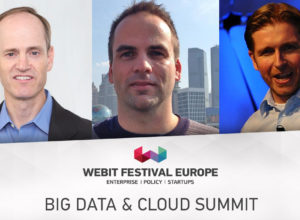Tag: Big Data
IBM stored information in an atom. What that means for BigData...
Reducing the size of computer components is a process that never stops surprising us over the past few decades.
But IBM managed to shock even the biggest tech enthusiasts, announcing that it has managed to read and write data into a single atom.
Although the achievement is still far from its practical application, it is a clear evidence that the concept of atomic data storage is more than accomplishable in the near future.
Today’s hard drives take about 100 000 atoms to store a single bit of data, but IBM’s experiment just showed us how much more we can work to improve the computing and storing processes we know now.
According to the company, when the technology of atom storage is fully developed, the entire Apple music catalog will be stored in a hard drive with the size of a coin.
Тhis has the potential to drastically change the way we see our computing devices. Few years ago we could not imagine that one phone can store hundreds of gigabytes of information, but now this is just one of many remarkable features of the top products on the market.
In the near future our wearable gadgets like smartwatches or rings could carry all our personal data. That kind of advance will be really big for the industry, that is expected to generate 17.6 trillion gigabytes of data by the end of 2017.
In order to store and analyze all that information, enterprises are going to have to increase their spending. IDC predicts that worldwide revenue for big data and business analytics will grew from nearly $122 billion in 2015 to more than $187 billion in 2019. That is a 50% increase over five years.
More than half of that spending will go to services providers, while companies will spend about $55 billion on big data software and $28 billion on hardware in 2019. Sectors like utilities, resource industries, healthcare and banking are likely to see their big data spending rise the fastest, while manufacturing will remain the biggest big data spender overall.
If you want to keep up with the hottest trends in the world of data usage and analytics Webit.Festival is the right place for you. During the Big Data & Cloud Summit, you can listen to top level speakers such as the VP for Cloud and Mobile Technology Strategy at IBM Jonas Jacobi and the CTO of Intel Security for EMEA region Raj Samani.
Here you can see a full list of the confirmed speakers at Webit.Festival, while here you can get all the information you need about the tickets for the event.
Webit.Festival will show you how Big Data and Cloud Services are...
We are standing at the start of a giant transformation, that will change every business and aspect of our lives. In the past two years the world has created more data than in the entire previous history of human race.
According to EMC study, the data volumes are growing so fast, that by the end of 2020 we will create 1.7 megabytes of new information every second. By then our digital storage will grow from 4.4 zettabytes today to around 44 zettabytes, or 44 trillion gigabytes.
Right now the Big Data market worldwide stands around $7.6 trillion, which is bigger than the whole fuel industry. This is the reason many experts said that data has finally become the new oil of the world.
In the next few years we expect the number of connected devices worldwide to reach more than 34 billion. This news is more than welcome for the business, because all the gathered information will completely change the way enterprises approach their customers.
The expanding big data comes with adoption of cloud technology and online delivery of hosted services. This enables companies to consume a computing resources, such as virtual machine or storage, rather than having to build and maintain their own computing infrastructures. In 2016 the spending on public cloud infrastructure reached $38 billion, while Forbes predicts that it will grow to $173 billion in 2026.
At this year’s Webit.Festival you can listen to some of the top experts in those innovative fields of digital industry. During the Big Data & Cloud Summit they will share their thoughts on the development of IoT, Artificial Intelligence, Cloud Technology and convergence of cognitive and cloud security as a business enabler.
The Vice President of Cloud and Mobile Technology Strategy at IBM Jonas Jacobi will talk about the power of the combination between AI and IoT and how it will impact our daily lives - both personal and professional.
Meanwhile, the Community Director and Technology Evangelist at TIBCO Kai Waehner will tell the audience about the latest trends in Cloud Native Architectures, Hybrid Integration Platforms and Microservices. He will also talk about Big Data Analytics, Machine Learning and Real Time Event Processing.
IBM’s Chief Information Officer on Cloud & SaaS Operational Services David Cass will explain some of the fundamental digital changes that the world is going through and how the use of Cognitive and Cloud is helping businesses transform themselves and deliver insights not previously available to them.
The CEO and Co-Founder of Resillo Inc. Eric Klinker will share his global forecast for edge computing and will explain why the rapid scaling of systems across every conceivable industry will not accommodate traditional thinking or traditional architectures.
Big Data analytics is the next frontier for digital knowledge
After a landmark year, in which companies worldwide began to analyze databases of all forms and sizes we can expect systems supporting large volumes of structured and unstructured information to continue rising.
We know well that there is huge amount of valuable information in the corporate world, but there are few companies that are using its full potential. The data that your company already owns can show you a lot about the way your customers are thinking, what do they want and what they are thinking about your brand.
Market already demands platforms and services for data management and security. In the same time we are going to see a lot of tools, that empowers users to analyze that data.
Today Big Data is not something, that only enterprise use. In fact it is a game changer for every industry and is even messing in the political life. As Vice’s Motherboard reported, data analysis from social media is among the key factors for the victory of Donald Trump in the USA presidential elections.
Psychologist Michal Kosinski developed a method to analyze people based on their Facebook activity. Five years ago he proved that it is possible to predict user’s skin colour, sexual orientation, political affiliation, intelligence, religion and even alcohol use on the basis of just 68 “likes” in the social media.
This type of analytics can bring enormous benefits for the business because it can be used not only for creation of psychological profiles, but also for searching them around the web.
Expert believe that in 2017 many small and midsize companies will form strategies for taking more of their applications to the cloud and out of the data centers. This will save them costs of investment in equipment and will lead them towards subscribing to services.
Moving data analytics to the cloud will accelerate the process of turning your data into action.
Big Data will help businesses to precisely predict future behaviors and events and improve their profits. This will be a key factor for minimizing revenue risk exposure and improving of operational effectiveness.
If you want to keep up with the hottest trends in the world of data usage and analytics Webit.Festival is the right place for you. During the Big Data & Cloud Summit, you can listen to top level speakers such as the VP for Cloud and Mobile Technology Strategy at IBM Jonas Jacobi and the CTO of Intel Security for EMEA region Raj Samani.
Digital revolution – transformation of the business
We have all seen how the technological advances change the world around us by the day. They have change the way we live, the way we communicate with others, the way we organize our lives. And they are rapidly changing the way the businesses work.
The introduction of new technology has led to not just changes in the existing businesses, but also to the creation and development of whole new fields like outsourcing. By making ideas more easily shareable than ever it has become simple to find like-minded people and create a startup together. This, combined with the power on the Internet has led to the creation of giants like Facebook, but has also allowed small business like WhatsApp to grow immensely over the course of a few years.
Technology has affected the business in many ways, both directly and indirectly. On one hand, it has become easier for business to find new talent and build a lasting relationship with their customers with the power of social networks. On the other hand, it has become easier for customers to find a new company that can give them more value for their money, which has forced big companies to try and find new ways to satisfy their customers.
One of the biggest changes we have seen in the recent years has been the development and popularizing of “loyalty programs”. While they look innocent and like a small change, programs like Tesco Clubcard or Wizzair’s Wizzclub have greatly affected the way people spend their money. By becoming a part of the club you are not only accepting the rewards it gives, but you are accepting the responsibility to keep giving your money to this company and not any other. The loyalty programs have also enabled companies to collect big data about their customers – what is the demographic, how much do people spend on average, what are their habits. By finding an answer to all these questions, a company can greatly improve the service it provides, which leads to more people joining the program, which leads to more data and so on.
Technical advances have been affecting the business world ever since the invention of the steam engine. However, it has only been in the recent decades, with the invention of the Internet that we have seen a skyrocket of the impact technology has on every industry. No one can imagine building a company nowadays without having an IT department, or at least and IT guy. In the foreseeable future technology will keep increasing its impact on every area of our lives and on every area of our businesses.
Big cloud, big data, big challenge
It’s human nature to strive for big, for grandiosity, `the bigger, the better`, they say. With the infinite quantity of information we have today, everything around us is big. Big data, big cloud as well as big challenges along with them. Where do these challenges come from you will ask?
As it has been stated above, nowadays we want everything to be big, so it is. Big data refers to the ever-increasing volume, velocity, variety, variability and complexity of information. But why challenges should be also big? Because there is one and only thing which is not big enough, it is even small, insignificant. This is the control we have over this endless quantity of information. We still do not know what to do with the big data, how to analyze it, to take advantage of it, to use it anyway at all. The problem is not how big the data is, but what do you want to know from it. Once you clarify this to you, you have the right answer.
Big data is the logical consequence of the digital era we live in and the logical consequence of big data is big cloud. Information should be stored somewhere and here comes big cloud. Convenient, more or less secure, satisfactory decision.
The influence of all these big stuff on marketing cannot be anything else but also big. It refers to the decision-making process, analysing, media planning, etc. It is important for marketing experts to know what data to gather, which analytical tool to use and how to go from data to insight to impact. It won’t be easy, but have in mind that you shouldn’t try to save the world. At least not at first.
CEEDS`15 by Webit is where you will learn much about big data, big challenges and most importantly - how to cope with them. Hurry up and buy your tickets with early bird prices of 100 EUR.
Big Data for retailers and competitive intelligence
Competitor intelligence is a specific type of market intelligence. As a result, a good quality provider of market intelligence should offer competitor intelligence as part of its range of services.
According to the definition, we found in Wikipedia, competitive intelligence as:
‘The action of defining, gathering, analyzing, and distributing intelligence about products, customers, competitors, and any aspect of the environment needed to support executives and managers making strategic decisions for an organization’.Literally, it means to know what is going outside of your business, in order for you and your products to be competitive and relevant to the market. It is inevitable when talking about retailers and competitive intelligence, not to talk about big data. And it is not just big, but it gets bigger every single day. The question here is if retailers could control the data gathering and how to manage the whole process. The truth is that there is more information available to the business than ever before. However, information that can really help a business make decisions is scarce and valuable. So you should pick and gather preferably. It is extremely difficult to measure the ROI of market intelligence, respectively of customer intelligence; nevertheless, it is clear that the price of projects broadly reflect the potential benefits. The most expensive studies are market entry intelligence studies, on the basis of which huge investments are often made (or avoided). 10 days left till the 6th Global Webit Congress in Turkey. Our speakers have prepared plenty of good practices for you, so book your tickets now!
Webit speakers: Aurelie Pols, Digital Analytics
Meet Aurélie Pols, Webit Speaker, Chief Visionary Officer & Founder of Mind Your Group. She will be joining us at the blue track of the Global Webit Congress.
Aurélie has extensive background and experience in Digital Analytics. She pioneered Digital analytics in Europe by stating vendor independence and focusing on the interaction of tools and data to support business strategies.This allowed her to co-found OX2 in Belgium in 2003, which was successfully sold to UK based Digitas LBi (Publicis) in 2008.
In 2012 she co-founds Mind Your Group in Spain addressing issues revolving around digital analytics, including Social Media and Privacy.
Dedicated to analytics since 2001, she is listed in Avinash Kaushik’s top 10 analytics blogs. She is Web Analytics Demystified’s initial principal consultant for US based web analytics guru, Eric T. Peterson.
 Of International background she was Globalization Chair for the Digital Analytics Association (DAA) and serves on the Board of Stockholm’s eMetrics Marketing Optimization Summit.
Today she speaks at various events such as eMetrics, O'Reilly's Strata and the IAPP, The International Association of Privacy Professionals.
After a decade of gathering technical knowledge about the use of analytics tools through a range of certifications, she focuses on delivering value to the bottom line with keeping an eye on data protection legislation, pushing a Privacy by Design agenda.
Her main focus, besides coaching analysts and data officers, are data integrations and vizualizations; digital analytics teams with their HR set-up & Privacy within the context of Big Data.
She will be presenting her experience and knowledge at the blue track of the Global Webit Summit. The topic that she will be presenting is: "Assessing Risks in the Cloud to fuel Big Data Initiatives".
Join the discussion at the 6th Global Webit Congress in Istanbul. Come join Aurelle Polls and over 200 distinguished speakers at the Global Webit Congress. Book your ticket now.
Of International background she was Globalization Chair for the Digital Analytics Association (DAA) and serves on the Board of Stockholm’s eMetrics Marketing Optimization Summit.
Today she speaks at various events such as eMetrics, O'Reilly's Strata and the IAPP, The International Association of Privacy Professionals.
After a decade of gathering technical knowledge about the use of analytics tools through a range of certifications, she focuses on delivering value to the bottom line with keeping an eye on data protection legislation, pushing a Privacy by Design agenda.
Her main focus, besides coaching analysts and data officers, are data integrations and vizualizations; digital analytics teams with their HR set-up & Privacy within the context of Big Data.
She will be presenting her experience and knowledge at the blue track of the Global Webit Summit. The topic that she will be presenting is: "Assessing Risks in the Cloud to fuel Big Data Initiatives".
Join the discussion at the 6th Global Webit Congress in Istanbul. Come join Aurelle Polls and over 200 distinguished speakers at the Global Webit Congress. Book your ticket now.
 Of International background she was Globalization Chair for the Digital Analytics Association (DAA) and serves on the Board of Stockholm’s eMetrics Marketing Optimization Summit.
Today she speaks at various events such as eMetrics, O'Reilly's Strata and the IAPP, The International Association of Privacy Professionals.
After a decade of gathering technical knowledge about the use of analytics tools through a range of certifications, she focuses on delivering value to the bottom line with keeping an eye on data protection legislation, pushing a Privacy by Design agenda.
Her main focus, besides coaching analysts and data officers, are data integrations and vizualizations; digital analytics teams with their HR set-up & Privacy within the context of Big Data.
She will be presenting her experience and knowledge at the blue track of the Global Webit Summit. The topic that she will be presenting is: "Assessing Risks in the Cloud to fuel Big Data Initiatives".
Join the discussion at the 6th Global Webit Congress in Istanbul. Come join Aurelle Polls and over 200 distinguished speakers at the Global Webit Congress. Book your ticket now.
Of International background she was Globalization Chair for the Digital Analytics Association (DAA) and serves on the Board of Stockholm’s eMetrics Marketing Optimization Summit.
Today she speaks at various events such as eMetrics, O'Reilly's Strata and the IAPP, The International Association of Privacy Professionals.
After a decade of gathering technical knowledge about the use of analytics tools through a range of certifications, she focuses on delivering value to the bottom line with keeping an eye on data protection legislation, pushing a Privacy by Design agenda.
Her main focus, besides coaching analysts and data officers, are data integrations and vizualizations; digital analytics teams with their HR set-up & Privacy within the context of Big Data.
She will be presenting her experience and knowledge at the blue track of the Global Webit Summit. The topic that she will be presenting is: "Assessing Risks in the Cloud to fuel Big Data Initiatives".
Join the discussion at the 6th Global Webit Congress in Istanbul. Come join Aurelle Polls and over 200 distinguished speakers at the Global Webit Congress. Book your ticket now. Big Data, Big Cloud and Big Risks
Initially the trend was about processing the Big Data inputs to render helpful insights. Storing enormous data from various sources in the Big Cloud is rewarding and cost effective. At the same time, it creates Big Risks of cyber attacks for businesses.
Big Data 1.0 was about processing massive data inputs to render insights. The next wave is about stitching data together, putting it to work while taking advantage of SaaS cloud solutions.
Big Cloud can be an outstanding way for cost-effectively deliver enormous value to businesses, using employee and customer data.
Big Risk are associated with data breaches dominating the headlines lately. It is vital that companies protect their information, while respecting compliance requirements.
The Big Cloud session of the blue track at the Global Webit Summit will explore future trends and topics related to Big Data, the Big Cloud and associated Big Risks for businesses.
Aurelie Pols, Chief Visionary Officer at Mind Your Group, and many other distinguished speakers at the blue track of the Global Webit Congress will present their experience and advice that can be useful to industries cope with risk assessments, technical planning and ongoing training to hedge against new cyber risks.
Join the discussion at the 6th Global Webit Congress in Istanbul. Book your tickets now!
Internal Data Science and the Hypercomputing Future
The great majority of scientific research rely heavily on our ability to extract value out of data. Challenging the way we capture, store and process data is fundamental for our ability to fully capitalize on the promise of data.
Currently this “internal” aspect of data science is largely neglected, and receives only little attention or funding in academia or commerce.
At the blue track of the Global Webit Congress, we realize that Big Data, Big Cloud and real time data analytix are trends of the future.
That is why the speakers at the blue track of the Global Webit Congress together with 400 investors, 300 accredited media and thousands of C-level attendees will discuss such hot future topics as:
- Internal Data Science: The mythical art of high performance computing…is it alchemy?
- Brand New Computing: How to increase computational output 1000 times without spending more
- Hypercomputing: What is it and why don’t we have it already?








